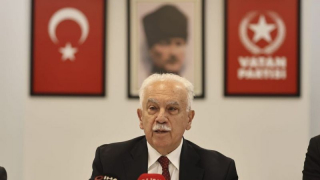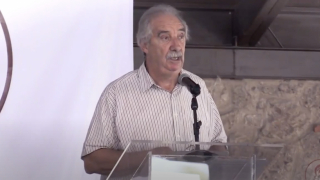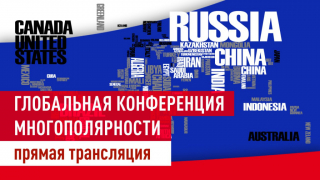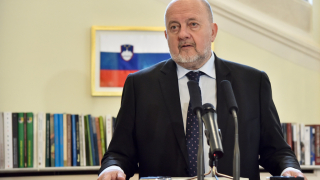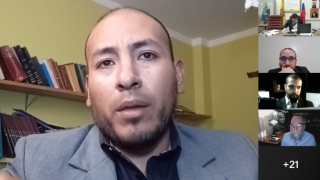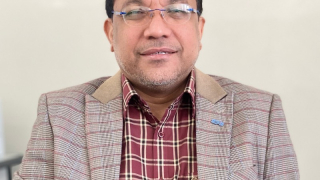The way to restore the balance between the great powers
We live in a world with many different races, religions, ideologies, cultures and heritage. In order to establish order and international law with the institutions that maintain it, the fact that there are different religions, economic systems and political arrangements in the world must be recognized, and that there are no universal truths or universal models. In his book The Clash of Civilizations, Huntington says:
Every civilization sees itself as the center of the world and writes its history as the central drama of human history. This has been perhaps even more true of the West than of other cultures. Such monocivilizational viewpoints, however, have decreasing relevance and usefulness in a multicivilizational world. Scholars of civilizations have long recognized this truism. In 1918 Spengler denounced the myopic view of history prevailing in the West with its neat division into ancient, medieval, and modern phases relevant only to the West. It is necessary, he said, to replace this "Ptolemaic approach to history" with a Copernican one and to substitute for the "empty figment of one linear history, the drama of a number of mighty cultures." A few decades later Toynbee castigated the "parochialism and impertinence" of the West manifested in the "egocentric illusions" that the world revolved around it, that there was an "unchanging East," and that "progress" was inevitable. The UN system is the result of joint struggle of democratic forces during the Second World War against the fascist forces and principles that have emerged as a result of this ideology.
However, the exclusivity and self-confidence of the Nazis regarding the system they created and which they tried to spread to other parts of Europe and the world by force, did not disappear with the collapse of Germany in World War II. We have forgotten that most genocides in the world were committed by countries and peoples of Western civilization, who spread their influence with physical force and weapons. As Huntington says:
The key to the Westerners' success in creating the first truly global empires between 1500 and 1750 depended upon precisely those improvements in the ability to wage war which have been termed 'the military revolution." The expansion of the West was also facilitated by the superiority in organization, discipline, and training of its troops and subsequently by the superior weapons, transport, logistics, and medical services resulting from its leadership in the Industrial Revolution. The West won the world not by the superiority of its ideas or values or religion (to which few members of other civilizations were converted) but rather by its superiority in applying organized violence. Westerners often forget this fact; non-Westerners never do.
The war in Bosnia and Herzegovina, like the breakup of Yugoslavia, was partly caused by the pressures and interests of some Western powers, but it was stopped with the mediation of the USA. The Dayton Accords have been highly successful at bringing a durable peace to BiH, largely because the democratic constitutional system they established respects the rights of BiH’s two Entities and three constituent peoples.
The BiH Constitution’s mechanisms protecting the interests of the Constituent Peoples and the Entities mean that legislation on a contentious issue must be the product of negotiations and consensus building rather than the dictate of a bare majority.
Unfortunately, some elements of the international community fail to appreciate the importance of the Dayton principles for BiH’s future stability and success, and so they continue to undermine the Dayton system and build more centralized structure. The Office of the High Representative (OHR) is an ad hoc international institution responsible for overseeing implementation of civilian aspects of the Peace Agreement, but High Representatives claimed dictatorial authority over BiH that conflicts with their strictly limited responsibilities laid out in Annex 10 of the Dayton Accords.
The Peace Implementation Council, established by the Peace Implementation Conference held in London on December 8-9, 1995, to mobilise international support for the Agreement, in 1997 extended powers of the OHR, to act as they judge necessary to implement the Dayton Accords. But High Representatives have interpreted these powers to mean imposing substantial legislation and even annulling constitutional court decisions. The so-called Bonn Powers further empowered the High Representative to adopt binding decisions and remove public officials from office. Neither the Peace Implementation Council -an ad hoc group of countries with no legal authority over BiH- nor the UN Security Council have ever bestowed on the High Representative legal authority beyond its mandate under the Dayton Accords. Over the years, successive High Representatives have acted illegally as colonial viceroys and worked aggressively to replace the highly decentralized BiH mandated by the BiH Constitution with the unitary state that was the Bosniak Muslim army’s wartime goal.
On 27 May 2021, a western majority of the ambassadors representing members of the PIC Steering Board purported to appoint German politician Christian Schmidt to succeed Valentine Inzko as High Representative. This represents another serious violation of article 41 of Vienna Convention on Diplomatic Relations and the principle of non-interference in internal affairs of a host state. Mr. Schmidt’s purported appointment is entirely illegitimate, because there is no legal basis for the PIC Steering Board or a majority thereof to appoint a new High Representative. Neither the Dayton Accords nor the UN Security Council granted the PIC or its steering board any such authority.
Neither China nor Russia supported the appointment of Christian Schmidt. No high representative in the history of Bosnia and Herzegovina was from either China or Russia. They were from Austria, Germany, the United Kingdom, Sweden and Slovakia.
The Constitutional Court of Bosnia and Herzegovina have nine members: six members from Bosnia and Hercegovina and three foreign members selected by the President of the European Court of Human Rights. Never selected any Russian. In many important decisions, two Bosniak Muslim together with 3 foreign members, outvoted two Serbs and two Croats, thus violating the Dayton principles and the adopting the decisions which undermine constitutional provisions of BiH. Three foreign members were supposed to be removed more than five years after the initial appointment of judges, but still remained 28 years after the end of the war. In this and other cases, there was a unilateral, voluntaristic and violent approach in the implementation of the Dayton Agreement by the Western countries, but it is still a treaty of international law, and its implementation should involve equally great powers, with the participation of the United Nations. The consequence of this is that the countries that had the most interference in internal affairs in BiH: USA, UK and Germany, with their biased acts and decisions, undermined the trust between peoples, reduced the possibilities for reaching an agreement and brought BiH to a state of permanent political crisis.
The political viewpoint and modus operandi in Sarajevo, among Bosniak-Muslim politicians, is that for any failure to reach an agreement, the way out is sought in the imposition of a solution by the High Representative.
We see such examples all over the world. Because of all this, and we can learn from the example of Bosnia and Herzegovina, we need to work on the affirmation of international law, the restoration of the authority of international institutions, the restoration of the balance between the great powers and other countries and trust in mutual agreement and compromise.


